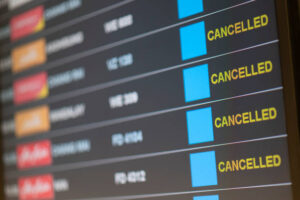Imagine arriving early at the airport for your flight. You check in your luggage, make your way to the departure lounge, and settle in to wait for the boarding call. However, as the minutes tick by, there’s no announcement. Time continues to pass, and still no updates. Eventually, an announcement reveals your flight has been cancelled. This scenario is all too familiar for many passengers. In this article, we explore your rights as an air traveler in Nigeria under the Nigerian Civil Aviation Regulations (NCAR) and the internationally binding Montreal Convention, highlighting relevant case laws and practical remedies.

Legal Framework for Air Passenger Rights in Nigeria
The Nigerian Civil Aviation Authority (NCAA) is the primary body regulating air transport operations in the country, established under Section 4 of the Nigerian Civil Aviation Authority Act 2022. The NCAA enforces standards and provides oversight under Part 19 of the Nigerian Civil Aviation Regulations 2023 (NCAR 2023), which focuses on consumer protection in civil aviation. The Montreal Convention, ratified by Nigeria, supplements this regulatory framework by providing uniform standards for liability, delays, and passenger compensation on international and non-international flights.
Common Issues Faced by Air Travelers and Their Rights
-
Flight Delays
Passengers are entitled to compensation and assistance during delays under NCAR 2023 and Article 19 of the Montreal Convention, depending on the circumstances.
- Domestic Flights:
For delays exceeding 30 minutes, the airline must inform passengers of the reason. For delays over two hours, passengers are entitled to refreshments, meals, and access to communication (e.g., phone calls or emails). If the delay exceeds three hours, the airline must offer rerouting or reimbursement[1]. Delays extending past 10:00 PM or airport closure times necessitate hotel accommodation at the airline’s expense. In cases where the delay exceeds six hours, passengers can claim 25% of their ticket price as compensation[2].
- International Flights[3]:
For delays between two and four hours, passengers are entitled to a 30% refund of the ticket price and assistance such as meals and free communication services. Delays exceeding six hours require the airline to provide hotel accommodation and transportation to and from the hotel.
In Aero Contractors Nigeria Ltd. v. Nigerian Civil Aviation Authority & Ors (2020)[4], the court held that the failure of an airline to provide adequate reasons for prolonged delays violated Part 19 of the NCAR and entitled the passengers to compensation.
-
Flight Cancellations
Cancellations are governed under Part 19 of NCAR and Article 5 of the Montreal Convention.
- Domestic Flights: Airlines must notify passengers at least 24 hours before the scheduled departure time.
- International Flights: Airlines must notify passengers at least seven days before the scheduled flight. For cancellations between three and seven days, passengers must be offered rerouting options.
Passengers are entitled to compensation for cancellations without adequate notice unless the airline proves the cancellation was caused by extraordinary circumstances, such as bad weather, political unrest, or security threats.
In Ethiopian Airlines v. Ajayi (2015)[5], the court upheld a passenger’s right to compensation after the airline failed to give sufficient notice of cancellation and could not demonstrate extraordinary circumstances.
-
Denied Boarding
Passengers may be denied boarding voluntarily or involuntarily:
- Voluntary Denial of Boarding (Overbooking): Airlines often overbook flights, anticipating some passengers will not show up. In such cases, airlines must request volunteers to forgo their seats in exchange for compensation and rerouting.
- Involuntary Denial of Boarding[6]: If no volunteers are found, the airline must compensate passengers denied boarding involuntarily. This includes rerouting, reimbursement, or compensation for damages caused by the denial.
In Aziz v. Arik Air (2017)[7], the court ruled in favour of a passenger who was involuntarily denied boarding due to overbooking, ordering compensation for the breach of contract and additional damages for the inconvenience caused.
The Montreal Convention and Its Impact
The Montreal Convention, ratified in Nigeria, provides a global framework for air passenger rights, addressing liability for delays, cancellations, and damages.
Key Provisions Relevant to Passengers
- Article 19 – Delays: Airlines are liable for damages caused by delays unless they can prove that all reasonable measures were taken to avoid the delay.
- Article 17 – Injury or Death: Passengers who are injured during flights are entitled to compensation.
- Article 22 – Damage to Baggage: Airlines are liable for up to 1,131 Special Drawing Rights (SDRs) for lost or damaged baggage.
- Article 29 – Exclusive Remedy: Passengers can only claim compensation under the Convention and not through additional tort or contract remedies.
In Stott v. Thomas Cook Airlines Ltd. (2014)[8], the UK Supreme Court ruled that claims for emotional distress caused during a flight are precluded under the Montreal Convention unless they qualify as physical injury under Article 17.
What Should Passengers Do?
- File Complaints Promptly: Passengers should immediately lodge complaints with the airline or the NCAA if their rights are violated.
- Document Evidence: Passengers must keep records, including tickets, receipts, and correspondence with the airline.
- Seek Legal Advice: For complex cases, consulting a lawyer can help in obtaining full compensation.
Conclusion
We have made an attempt above to examine some of the challenges usually faced by passengers when traveling by air, focusing on the provisions of the Montreal Convention and the Nigerian Civil Aviation Regulations.
The Nigerian Civil Aviation Regulations and the Montreal Convention ensure robust protections for air travelers, compensating them for delays, cancellations, denied boarding, and other challenges related to air travel. While these frameworks aim to enforce compliance and fairness, passengers must be proactive in asserting their rights.
Further, the above is a general appraisal of the laws and regulations of air travel, especially pertaining to Consumer Protection in the Civil Aviation industry in Nigeria. Facts of specific incidents may require departure from some of these provisions referred to above. Thus, when faced with challenges related to carriage by air, it is important to consult a lawyer to seek comprehensive advice.
[1] Section 19.9, Subsection 19.9.1.1 of Part 19 of the NCAA Regulations 2023.
[2] Section 19.8, Subsection 19.8.1.1(a) of Part 19 of the NCAA Regulations 2023
[3] Section 19.6, Subsection 19.6.2.1 of Part 19 of the NCAA Regulations 2023.
[4] Unreported case, Federal High Court of Nigeria, 2020
[5] Ethiopian Airlines v. Ajayi (2015) LPELR-24753(CA)
[6] Section 19.4, Subsection 19.4.1.2 of Part 19 of the NCAA Regulations 2023.
[7] (Unreported), Federal High Court of Nigeria, Lagos Division, Suit No. FHC/L/CS/142/2017.
[8] Stott v. Thomas Cook Airlines Ltd. [2014] UKSC 15
- Oluwaseun Adedayo Omotoso is a Legal Practitioner, scholar and social commentator based in Lagos Nigeria.
Subscribe, follow, share!
Has this article been of help? Why not consider subscribing to our mailing list us for more.
Do not forget to share, Follow our pages on Facebook and Instagram and also subscribe to our WhatsApp Channel

